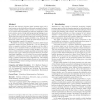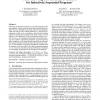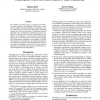590 search results - page 39 / 118 » Non-Failure Analysis for Logic Programs |
138
click to vote
PLDI
2009
ACM
15 years 9 months ago
2009
ACM
We show that recursive programs where variables range over finite domains can be effectively and efficiently analyzed by describing the analysis algorithm using a formula in a �...
122
click to vote
ICFP
2005
ACM
15 years 8 months ago
2005
ACM
Narrowing-driven partial evaluation is a powerful technique for the specialization of (first-order) functional and functional logic programs. However, although it gives good resu...
116
click to vote
AAAI
2006
15 years 4 months ago
2006
We establish a declarative theory of forgetting for disjunctive logic programs. The suitability of this theory is justified by a number of desirable properties. In particular, one...
166
click to vote
RULEML
2010
Springer
15 years 1 months ago
2010
Springer
Rule bases are common in many business rule applications, clinical decision support programs, and other types of intelligent systems. As the size of the rule bases grows and the in...
125
click to vote
APSEC
2008
IEEE
15 years 9 months ago
2008
IEEE
Memory usage analysis is an important problem for resource-constrained mobile devices, especially under mission- or safety-critical circumstances. Program codes running on or bein...



